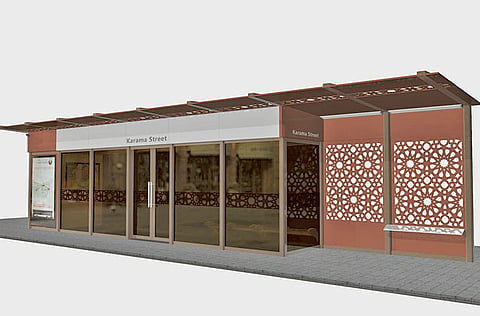More air-conditioned bus shelters for Abu Dhabi
Project to install shelters across the emirate will cost Dh100 million

Abu Dhabi: The Abu Dhabi Department of Transport (DoT) on Tuesday announced the roll out of Phase II of air–conditioned bus shelters across the Emirate of Abu Dhabi at a cost of Dh100 million.
The project is expected to be completed by the first quarter of 2014, Hashim Al Hashimi, Director of Public Transport Department at the Department of Transport (DoT), told Gulf News.
He said 160 air-conditioned bus shelters will be in Abu Dhabi city and its suburbs to meet growing demands in vital areas of the capital, with a further 80 in the Western Region and 120 in Al Ain and its suburbs.
Al Hashimi said the DoT continues to maximise the use of public transport through the incremental delivery of public transportation services that meet international standards and sustainability in line with its Surface Transport Master Plan (STMP).
“This project is a key priority for DoT while augmenting Abu Dhabi’s road transport infrastructure designed to ease traffic and reduce congestion. The project gives priority to hospitals, schools, shopping centres, [workers’ accommodation] and airports, followed by residential areas, parks, hotels, clinics and main roads, as well as industrial and isolated areas,” he said.
Al Hashimi said the move would not lead to any hike in ticket prices, noting that there would be machines within the shelters for customers to buy bus tickets or public transport cards.
“The doors will be manual, but with easy access to open as the previous ones which were installed in Phase I, 80 bus stop shelters, were damaged due to misuse as many people try to open them manually,” he saidd.
Marwan Al Merri, Project Committee Chairman, told Gulf News the new shelters meet international safety standards in terms of design, form and content to provide the ultimate comfort and convenience. Design specifications paid particular attention to wide doors, which are equipped with arms to assist people with special needs.
“We surveyed many people about the specifications and standards that they like the shelters to be, and after breaking down their feedback, we found out that they lean towards a cultural design that meets with UAE heritage and culture. That is why in the new bus stop shelters, they are designed as per Islamic culture,” said Al Merri.
“The design is based on Islamic architectural styles called “Mashrabiya”; this element of traditional Islamic architecture reflects the harmonious architectural renaissance of the emirate of Abu Dhabi,” saidd Al Merri.
He added: “The air-conditioned bus shelters were designed to provide current and future passengers’ need such as bus ticket and vending machines. DoT has already installed three... in Abu Dhabi City at Khalidiya area.”
Al Merri said strict measures have been taken to ensure environmental friendliness. The shelters feature the latest technology and are equipped with energy-saving ventilation fans for winter.
Al Hashimi said the shelters will come in three sizes to meet the needs of various passengers across the emirate
Small shelters will hold 16 people, with four seats and standing room for 12. There will be additional space for one wheelchair.
Medium-sized shelters will hold 24 people. They will have eight seats and a wheelchair space.
Large shelters will hold 28 people, with 10 seats and space for two wheelchairs.
Both DoT officials said all shelters will have an external capacity of 12 people and that buses will have automatic vehicle management (AVM) to show their location.
“The AVM will help us amend and follow the trips of buses in the emirate as the customers will have the ability to detect the trip schedules on displays to be fixed in each shelter,” said Al Hashimi.
Bus shelter locations
City of Abu Dhabi: Khalidiya, Al Falah, Tourist Club Area, City Center and Al Mushrif. Al Raha Beach, Bani Yas, Khalifa City (A), Al Mafraq, Mussafah, Al Samha, Yas Island and Abu Dhabi International Airport.
Western Region: Liwa, Al Ruwais, Al Sila, Delma Island, Bida Mutawa, Ghayathi and Jebel Dhanna.
Al Ain: Al Foah, Al Mutaredh, Al Khatam, Al Jaheli, Al Ain Municipality, Al Jimi and Al Qattara.



